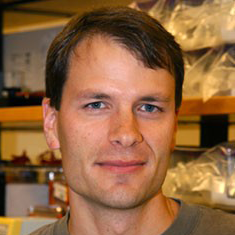
Research Topics
Tumor Angiogenesis Unit
New blood vessel formation, or angiogenesis, is a critical hallmark of solid tumor growth and anti-angiogenic agents have become a vital component of current cancer treatment regimens. The appeal of anti-angiogenic therapy can be attributed to several advantages of targeting the endothelial cells that line blood vessels, rather than the tumor cells themselves. First, endothelial cells are directly exposed to circulating blood, facilitating drug delivery and enabling the use of high molecular weight therapeutics. Second, each vessel capillary supports hundreds of tumor cells. Third, endothelial cells are genetically stable and their ability to develop resistance may be limited. Finally, this type of therapy should be applicable to a wide variety of tumor types. Several anti-angiogenic agents that target the vascular endothelial growth factor (VEGF) pathway have been approved for the treatment of cancer. However, tumors can exploit alternative angiogenesis mechanisms when the VEGF pathway is blocked.
A major current goal of the Tumor Angiogenesis Unit is to understand the mechanisms of VEGF-independent angiogenesis that can lead to persistent tumor angiogenesis and tumor growth. We are also working to understand the biological functions of several cell surface Tumor Endothelial Markers (TEMs) that were previously found to be elevated in the angiogenic vessels of tumors. Two receptors, TEM5/GPR124 and TEM8/ANTXR1, are of particular interest because of their critical role in angiogenesis. We are using several genetically engineered mouse models to understand the functional role of these TEMs in vivo. We are also developing novel therapeutics, such as TEM8 neutralizing antibodies, in order to block angiogenesis and tumor growth. The end goal of this research is to use new molecular information on tumor angiogenesis to develop clinically useful agents for improved diagnostics and therapeutics of cancer and other vascular diseases.
Biography
Dr. Brad St. Croix received his Ph.D. in Medical Biophysics from the University of Toronto in 1998, under Dr. Robert S. Kerbel. He trained as a postdoctoral fellow in the laboratory of Dr. Bert Vogelstein at Johns Hopkins University under a fellowship from the National Cancer Institute of Canada. He joined the Mouse Cancer Genetics Program in 2002. His research focuses on the identification of molecules involved in human tumor angiogenesis and utilizes mouse models to translate new molecular information on angiogenesis into the development of novel diagnostics and therapeutics for cancer.
Selected Publications
- Yang L, Sheets TP, Feng Y, Yu G, Bajgain P, Hsu KS, So D, Seaman S, Lee J, Lin L, Evans CN, Guest MR, Chari R, St Croix B. Uncovering receptor-ligand interactions using a high-avidity CRISPR activation screening platform. Sci Adv. 2024;10(7):eadj2445.
- Feng Y, Lee J, Yang L, Hilton MB, Morris K, Seaman S, Edupuganti VVSR, Hsu KS, Dower C, Yu G, So D, Bajgain P, Zhu Z, Dimitrov DS, Patel NL, Robinson CM, Difilippantonio S, Dyba M, Corbel A, Basuli F, Swenson RE, Kalen JD, Suthe SR, Hussain M, Italia JS, Souders CA, Gao L, Schnermann MJ, St Croix B. Engineering CD276/B7-H3-targeted antibody-drug conjugates with enhanced cancer-eradicating capability. Cell Rep. 2023;42(12):113503.
- Hsu KS, Dunleavey JM, Szot C, Yang L, Hilton MB, Morris K, Seaman S, Feng Y, Lutz EM, Koogle R, Tomassoni-Ardori F, Saha S, Zhang XM, Zudaire E, Bajgain P, Rose J, Zhu Z, Dimitrov DS, Cuttitta F, Emenaker NJ, Tessarollo L, St Croix B. Cancer cell survival depends on collagen uptake into tumor-associated stroma. Nat Commun. 2022;13(1):7078.
- Szot C, Saha S, Zhang XM, Zhu Z, Hilton MB, Morris K, Seaman S, Dunleavey JM, Hsu KS, Yu GJ, Morris H, Swing DA, Haines DC, Wang Y, Hwang J, Feng Y, Welsch D, DeCrescenzo G, Chaudhary A, Zudaire E, Dimitrov DS, St Croix B. Tumor stroma-targeted antibody-drug conjugate triggers localized anticancer drug release. J Clin Invest. 2018;128(7):2927-2943.
- Seaman S, Zhu Z, Saha S, Zhang XM, Yang MY, Hilton MB, Morris K, Szot C, Morris H, Swing DA, Tessarollo L, Smith SW, Degrado S, Borkin D, Jain N, Scheiermann J, Feng Y, Wang Y, Li J, Welsch D, DeCrescenzo G, Chaudhary A, Zudaire E, Klarmann KD, Keller JR, Dimitrov DS, St Croix B. Eradication of Tumors through Simultaneous Ablation of CD276/B7-H3-Positive Tumor Cells and Tumor Vasculature. Cancer Cell. 2017;31(4):501-515.e8.
Related Scientific Focus Areas



Molecular Biology and Biochemistry
View additional Principal Investigators in Molecular Biology and Biochemistry
This page was last updated on Thursday, November 13, 2025